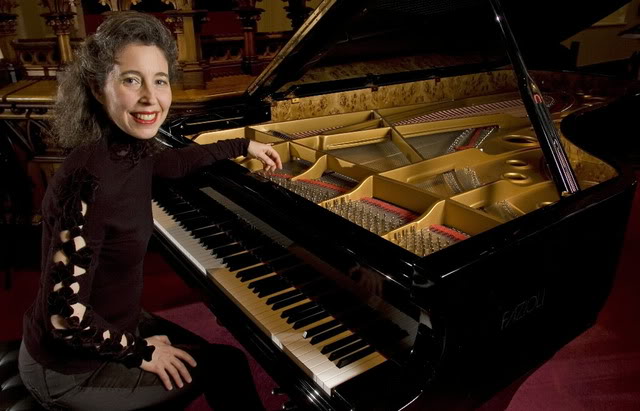Hewitt brings poetic delicacy and belated bravura to Bach and Debussy
Is it illegal yet to call a pianist’s playing “feminine”? Some artists, including women, might take exception to that. But if by feminine one means emphasizing the virtues of mindfulness, warmth, delicacy and wit over strength and aggressiveness, then Angela Hewitt’s recital of Bach and Debussy Friday night at the New England Conservatory’s Jordan Hall was a notably feminine event.
Although the printed program at this Celebrity Series of Boston presentation indicated a first half consisting of three French Suites by Bach, followed by three Debussy works after intermission, Hewitt elected instead to arrange the pieces so that the two composers alternated. While this change deprived the audience of the chance to hear 21 Bach dance movements in a row—and so to test the proposition that these little pieces, uniformly in binary form with repeats, contain a universe of expression–it did point up the family resemblance between Debussy’s suites and those of Bach, both of which look to eighteenth-century French models such as Lully, Couperin, and Rameau.
From the first bars of the prelude-like Allemande of Bach’s French Suite No. 4, it was clear that contemplation and sensibility would be the order of the evening. Molding the figurations gently, taking full advantage of her instrument’s ability to swell and taper the sound, luxuriating in broad ritards at the ends of sections, Hewitt seemed to be saying (to paraphrase Vladimir Horowitz’s remark about Mozart and Chopin) that one has to play Bach like Debussy, and Debussy like Bach.
In these dance movements, the player is instructed to repeat each of the two sections. Pianists sometimes omit repeating the second section, not wanting to seem to “start over” after the piece has ended, but Hewitt observed all the repeats, viewing the music from different angles and enriching the performance. The historical practice, much revived lately, of adding ornaments to the music during repeats can sound fussy and studied, but in Hewitt’s hands the little mordents, trills and slides seemed to bubble up from the keys as needed to make the music more expressive.
Turning to Debussy’s Suite bergamasque, Hewitt played “like Bach”—that is, her conception of Bach. In the bold opening gesture of the Prelude, she held back, as if viewing the music from a contemplative distance. The suite continued in that somewhat disembodied atmosphere, which bore remarkable fruit in the third movement at least, with the most evanescent, weightless rendering of Clair de lune this reviewer has ever heard. The always-unwelcome Passepied that follows, breaking the mood and closing the suite in a bustle of notes, didn’t break the mood enough this time; the performance, and the audience’s attention, seemed to drift. After so much floating, the brisk Allemande of the French Suite No. 6, with its crunchy-soft, staccato-legato texture, came as a relief.
The second half opened with the hit single of the French Suites album, No. 5 in G major, an appealing and melodious collection whose closing Gigue is one of Bach’s most virtuosic keyboard pieces. At long last, Hewitt went for it, driving the Gigue to an exhilarating finish that brought a startled gasp of appreciation from the audience. The artist bounced up from the bench for her bow, wearing a smile that seemed to say, “Didn’t think I could do that, did you?”
Things became even more heated after that. Hewitt went at the Prelude of Debussy’s suite Pour le piano with the assertiveness she had withheld from the bergamasque Prelude, didn’t shy away from the Sarabande’s fortissimos, and in her enthusiasm blurred the outlines of the closing Toccata.
Concluding the program with Debussy’s L’Isle joyeuse, Hewitt lit the piece’s Lisztian pyrotechnics and set off its erotic charge. As the music plunged to its mighty final thump on the piano’s lowest note and the audience leaped to its feet and roared, one found oneself wondering: Was all that restrained, laid-back playing in the first half a set-up?
For her single encore, Hewitt gave an exquisitely funny and sweet performance of a Debussy favorite, Golliwog’s Cake-walk.
Posted in Performances





